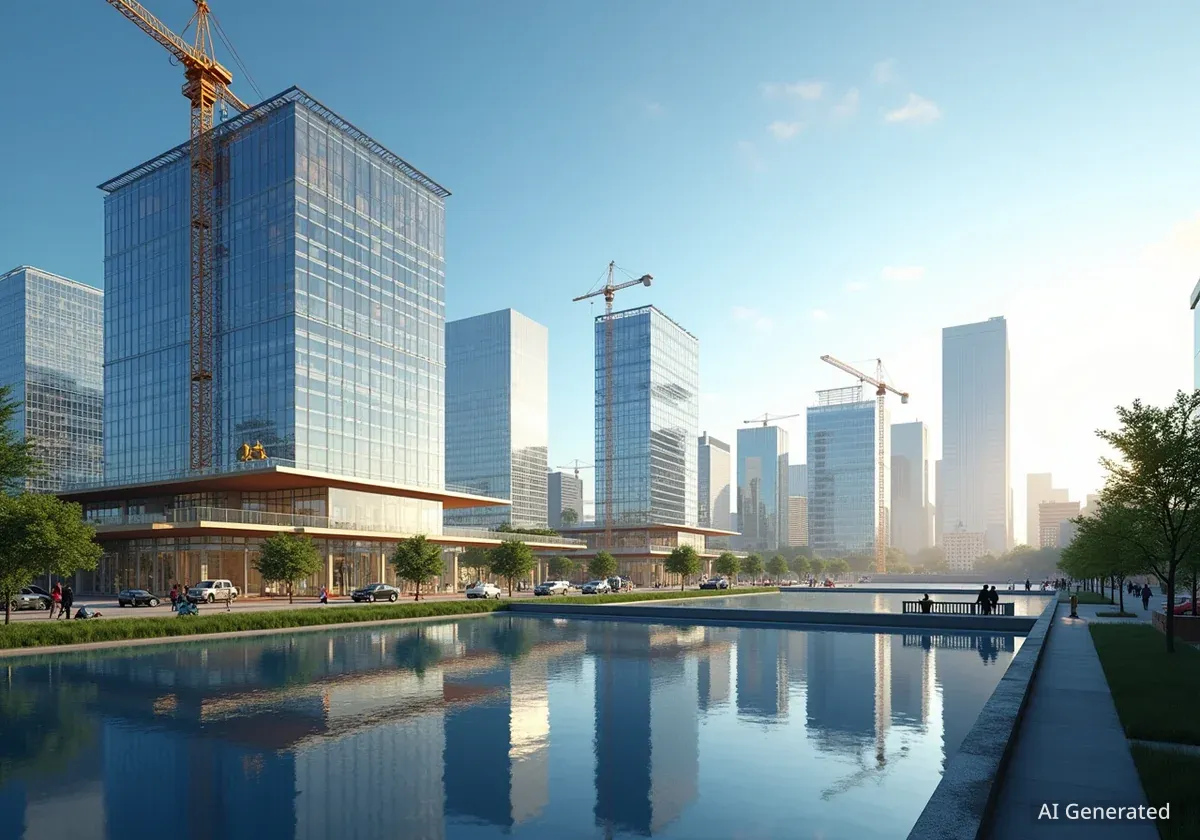Technology giant Innovate Corp has officially announced plans to construct a new $1.2 billion corporate campus in Austin, Texas. The project, named the "Nexus Campus," is expected to house over 7,000 employees and significantly impact the city's economy and real estate market.
The development will be located on a 70-acre site in Southeast Austin, a rapidly growing area of the city. Construction is slated to begin in the first quarter of 2025, with an estimated completion date in late 2028.
Key Takeaways
- Innovate Corp will invest $1.2 billion in a new corporate campus in Southeast Austin.
- The project is expected to create over 7,000 high-paying tech jobs upon completion.
- The development includes plans for public green spaces, retail areas, and community event venues.
- Concerns are being raised about the potential impact on local housing affordability and traffic congestion.
Innovate Corp Unveils 'Nexus Campus' Vision
Innovate Corp revealed the details of its new campus in a press conference held at Austin City Hall. The project is designed to be more than just a corporate office; it aims to be a mixed-use development integrated with the local community.
Company officials stated that the campus will feature multiple buildings with over 2 million square feet of office space. The architectural design emphasizes sustainability, with plans for LEED Platinum certification, extensive use of solar panels, and a water recycling system.
"The Nexus Campus represents our long-term commitment to Austin and its vibrant community," said Innovate Corp CEO, Jane Foster. "We are not just building a workplace; we are creating a space for innovation, collaboration, and community engagement that will benefit the entire city."
In addition to office space, the master plan includes publicly accessible parks, walking trails, an outdoor amphitheater, and 30,000 square feet of ground-floor retail space intended for local businesses.
Economic Projections and Community Impact
The announcement has been met with enthusiasm from city officials, who point to the significant economic benefits the project will bring. According to an economic impact study commissioned by the Austin Chamber of Commerce, the project is projected to generate substantial revenue and job growth.
Projected Economic Impact
- Jobs Created: 7,000 direct jobs at Innovate Corp and an estimated 4,500 indirect jobs in supporting industries.
- Construction Jobs: Approximately 1,500 jobs during the four-year construction phase.
- Annual Economic Output: An estimated $800 million in annual economic activity for the Austin metropolitan area once the campus is fully operational.
The company has also pledged a $25 million community benefits package. This fund will be directed towards local education initiatives, affordable housing programs, and workforce development to train local residents for jobs at the new campus.
Mayor of Austin, David Chen, praised the agreement. "This is a landmark investment in Austin's future," he stated. "Innovate Corp's commitment to local hiring and community benefits ensures that this growth will be inclusive and sustainable for all Austinites."
Real Estate Market Braces for Change
While the economic forecast is positive, the project is expected to place further pressure on Austin's already competitive real estate market. The influx of 7,000 well-paid employees will likely drive up demand for housing in Southeast Austin and surrounding neighborhoods.
Austin's Housing Market Context
Austin has been one of the fastest-growing cities in the United States for the past decade. According to the Austin Board of Realtors, the median home price in the city has increased by over 60% in the last five years, raising significant concerns about housing affordability for long-term residents.
Real estate analysts predict a sharp increase in property values within a five-mile radius of the new campus. This could provide a windfall for current homeowners but may also accelerate displacement and price out many prospective buyers and renters.
Community advocacy groups are calling on the city to implement stronger housing policies to mitigate the potential negative effects. They are advocating for inclusionary zoning and increased funding for the city's affordable housing trust.
Infrastructure and Public Policy Challenges
The scale of the Nexus Campus presents significant infrastructure challenges, particularly concerning transportation. Southeast Austin already experiences traffic congestion, and the addition of thousands of daily commuters will require major upgrades to local roads and public transit services.
City planners are working with Innovate Corp to develop a comprehensive transportation management plan. Proposed solutions include:
- Expanding existing bus routes to the campus.
- Constructing dedicated bike lanes connecting to the city's network.
- Implementing a subsidized ride-sharing program for employees.
- Building a multi-level parking garage to contain vehicle traffic on-site.
The city council will hold a series of public hearings over the next few months to discuss the zoning changes required for the project and to gather community feedback on the proposed infrastructure plans. The successful integration of the campus into the city's fabric will depend on careful planning and collaboration between the company, city government, and local residents.





